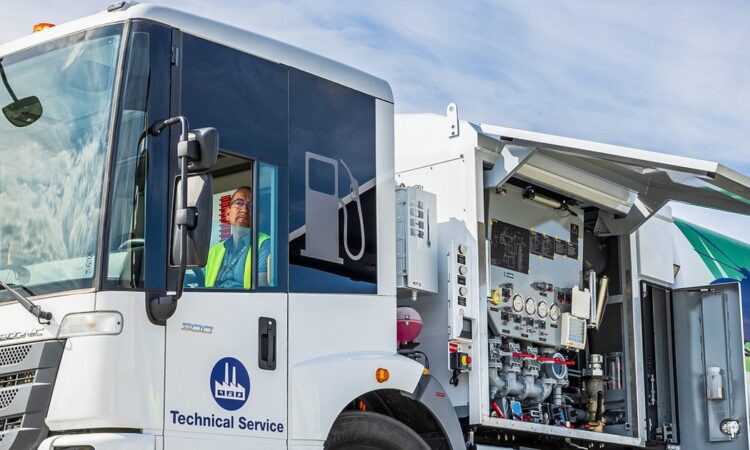- Collaboration between Mercedes-Benz Special Trucks and ROHR Spezialfahrzeuge GmbH to implement an electric helicopter refueling vehicle
- The Mercedes-Benz eEconic with its 16,500-liter tank helps reduce emissions at Airbus Helicopters
- After a single charging process, the eEconic can generally be used for an entire week in everyday working operation
Donauwörth, Wörth am Rhein – The Mercedes-Benz eEconic is refueling helicopters for the first time. Airbus Helicopters in Donauwörth has been using the all-electric truck from Mercedes-Benz Special Trucks for several weeks now. Airbus Helicopters’ initial experience shows that with the installed battery capacity, the tanker can be used in normal operation for about a week without intermediate charging. The tank body for the aviation fuel containing SAF (Sustainable Aviation Fuel) comes from ROHR Spezialfahrzeuge GmbH. The experts at ROHR and Mercedes-Benz Special Trucks have jointly implemented the integration of the tank and base vehicle. The intention behind the addition of the all-electric refueling vehicle to the fleet is to reduce emissions from the handling fleet and make the immediate vehicle environment a more pleasant place for employees to work.
The base vehicle: The eEconic from Mercedes-Benz Special Trucks
Due to its proven safety features, the Mercedes-Benz eEconic is ideal for use in dynamic working environments. The driver’s viewing angle is wider than in many other truck models thanks to the low panoramic window. The low seat position also allows the driver to observe what is happening at eye level with colleagues on the airfield and to maintain eye contact with them. Despite the long wheelbase of 5.5 meters, the eEconic has a relatively tight curve radius thanks to the steered rear axle. This allows the approximately 11-meter-long base vehicle to easily maneuver between ground personnel, other vehicles, landing helicopters, and even the rotating blades of helicopters that are starting up. The safety concept is complemented by training courses for ground personnel, which have been designed by experts at Mercedes-Benz Special Trucks, ROHR Spezialfahrzeuge GmbH and Airbus.
The eEconic has an electric axle with an integrated drive unit, as well as two electric motors that generate a continuous output of 330 kW. The battery packs of the eEconic can be charged at a power output of up to 160 kW. Since the pump in the tank body also draws on the vehicle batteries, a single charging process ensures the energy supply for both driving and refueling. Electrical energy can also be recovered through recuperation, which increases the operating period of the refueling vehicle with no intermediate charging. Another advantage of the electric drive: The exhaust gas, odor, heat, and noise pollution for airfield employees is significantly lower.
The tank from Rohr Spezialfahrzeuge GmbH
The vehicle is equipped with a special tank body with a useful capacity of 16,500 liters. The pump is operated hydraulically via an electric power take-off system (ePTO). As the pump in the tank body also draws on the energy stored in the vehicle batteries, one single charging process is sufficient to ensure the energy supply for both driving and refueling. For this vehicle solution, the specialists at ROHR focused on adapting standardized component parts and assemblies from a conventional combustion vehicle to an electric vehicle. This means that operating the vehicle requires little familiarization.
Mercedes-Benz Special Trucks and the tank specialist ROHR Spezialfahrzeuge GmbH use a shared user interface to display all relevant information, such as the batteries’ state of charge, remaining range, tank body fill level, or energy consumption, on the display in the driver’s cab.
The customer: Airbus Helicopters
Airbus has set itself the objective of reducing its carbon emissions to net zero by 2050. It sees the use of proven, sustainably produced aviation fuels as an important lever here. Today all Airbus aircraft and helicopters can already be operated on a 50% SAF mixture. By 2030, all Airbus helicopters will be certified to operate on 100% SAF.
At its premises in Bavarian Swabia, Airbus has been using more fuel with SAF content since 2023 and is gradually transitioning to fully electric vehicles in order to be able to operate its commercial vehicle fleet entirely electrically in the future. The procurement of the electric tanker, which is charged on site using green energy wherever possible, is a further step towards implementing this project.
Brummionline


